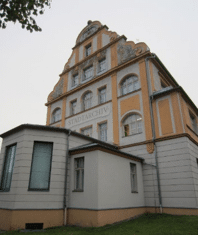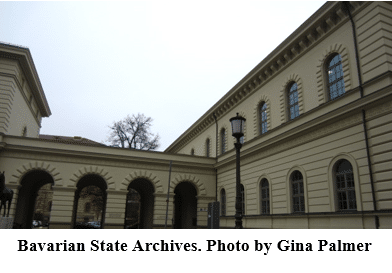Research in German Archives
 26
26Jun
As more and more records are digitized and made available online, it may be easy to dismiss the need for a physical visit to an archive. However, since not all records have been digitized, and not all digitized records are available online, it may be necessary to spend some time in an archive. In this post we focus on German genealogy archives. At Price Genealogy we have onsite professionals that are ready to assist us in archives worldwide.
One benefit of searching parish registers at an archive is the ability to search records from multiple parishes in one location, instead of having to visit individual parish offices to view their original records. Generally, a town of origin is needed before research in Germany can begin. Sometimes, the known town of origin for an ancestor may actually be the name of the larger or better-known town in the area, not their actual town of residence. For example, records may have indicated that Munich was the town of origin, when in fact, the ancestor came from Dornach, a small village about six miles east of Munich.
 Germany has many different kinds of archives. Following are just a few examples:
Germany has many different kinds of archives. Following are just a few examples:
- Federal Bundesarchiv
- State Hauptstaatsarchiv, Landeshauptarchiv
- City Stadtarchiv
- Church Landekirchliches Archiv der Evangelisch-Lutherischen Kirche, Diözesanarchiv, Bistumsarchiv
Additional archives of genealogical interest include libraries and collections of genealogical societies.
To make the most use of your time while at the archive, it is best to take time to prepare for your visit by taking the following steps:
German Genealogy
Identify an archive
- Determine the specific information and record type you are looking for. Example: A birth record of Anton Zimmermann born about 1836 in Bamberg, Bavaria. Civil registration had not yet begun in Bavaria, so the record of interest would be a Catholic church register.
- Identify archives that are likely to hold collections of your records of interest.
One way of finding a list of archives in an area or state of interest is to search the FamilySearch Research Wiki for “[state] Archives and Libraries,” e.g. “Bavaria Archives and Libraries.” This list will often include contact information for state and church archives. When searching for church records, the appropriate church archive would be your first choice. However, state archives may also have church records.
 Starting in the late 18th century, pastors were required to submit annual copies of baptism, marriage and burial registers to the local government.[1] Both state and church archives may have collections of these duplicate registers. In some areas, the original registers have also been gathered into central church archives.
Starting in the late 18th century, pastors were required to submit annual copies of baptism, marriage and burial registers to the local government.[1] Both state and church archives may have collections of these duplicate registers. In some areas, the original registers have also been gathered into central church archives.
Identify collections of interest
- Review the archive website for finding aids and to identify specific collection(s) of interest.
Archive websites often have a page for genealogical research and a collection containing baptism, marriage and burial registers of multiple parishes. The format of the collection can vary, though more and more are being digitized. Even when records have been digitized, often they can only be accessed on computers at the archive.
Archive research guidelines
- Review the archive website for days and hours of operation, fees, guidelines and restrictions.
Some archives require you to make an appointment or reserve a work-area or special computer. Many archives have separate workrooms for groups working together, allowing you to talk without disturbing other researchers. Also, certain materials may need to be reserved ahead of time so they are available when you arrive. Be aware of fee amounts and bring enough cash to cover your costs. Credit cards are not universally accepted in Germany. Review restrictions regarding use of digital cameras and other personal belongings. Do not hesitate e-mail the archive to ask questions as you prepare for your visit.
Additional tip: Consider the parking options. Are you allowed to use a dedicated parking lot? Will you need to park on the street, which may have a time limit? Is there a parking garage nearby?
On-site research
- Sign in. Some archives will issue a researcher pass.
- Personal belongings (jacket, backpack, food, water, etc.) need to be stored in provided lockers. Have a coin (e.g. €1.00) handy to use the lockers. Your coin will be returned.
- Submit record request if not previously done.
- Be prepared to pay a daily use fee. If you will be conducting research over multiple days, they may allow you to pay the total on your last day.
- Fees will also be incurred for copies and prints. Review the guidelines for proper copy procedures.
- Use available resources on-site, e.g. maps and directory of parishes and maps, to help in your research, as needed.
Remember to record what records you searched and what you found or did not find. You may want to create a spreadsheet or form ahead of time to help you record your findings. You are allowed to bring laptops into the reading rooms.
You can see that there is a lot of planning to goes into successful research in archives in Germany, and anywhere else. It takes a little while to get used to the archive’s systems and procedures.
The local researchers that Price Genealogy works with are already up to speed with all that it takes to successfully work on your ancestral lines, and they are skilled in reading the old records in German and in other languages. Since they live in the area, and work with these records on a regular basis, it is usually more cost effective to work with them than it typically is for Americans to travel to Germany, pay for transportation and hotels, and to efficiently utilize their time in the archives.
Price Genealogy searches easily accessible American records first, either those available online, on digital microfilm, or in the vast resources of the Family History Library in Salt Lake City. When records are not available in the United States, we turn to our onsite researchers in Germany and in other lands around the world. Please contact us today at (801) 531-0920 for a free consultation.
Gina
[1] FamilySearch Wiki (www.familysearch.org/wiki), “Germany Church Records,” rev. 11:52, 8 June 2020.
Do you have any other questions about German genealogy? Let us know in a comment below!
